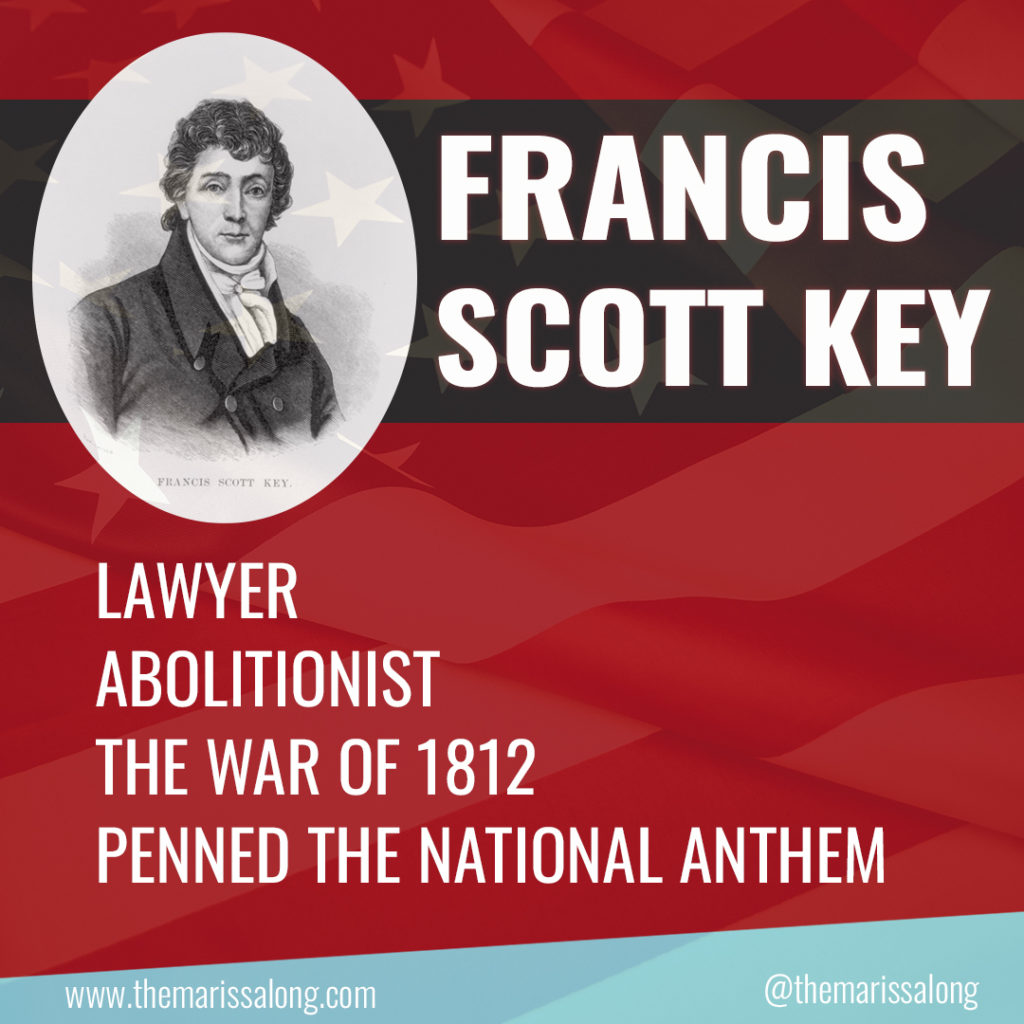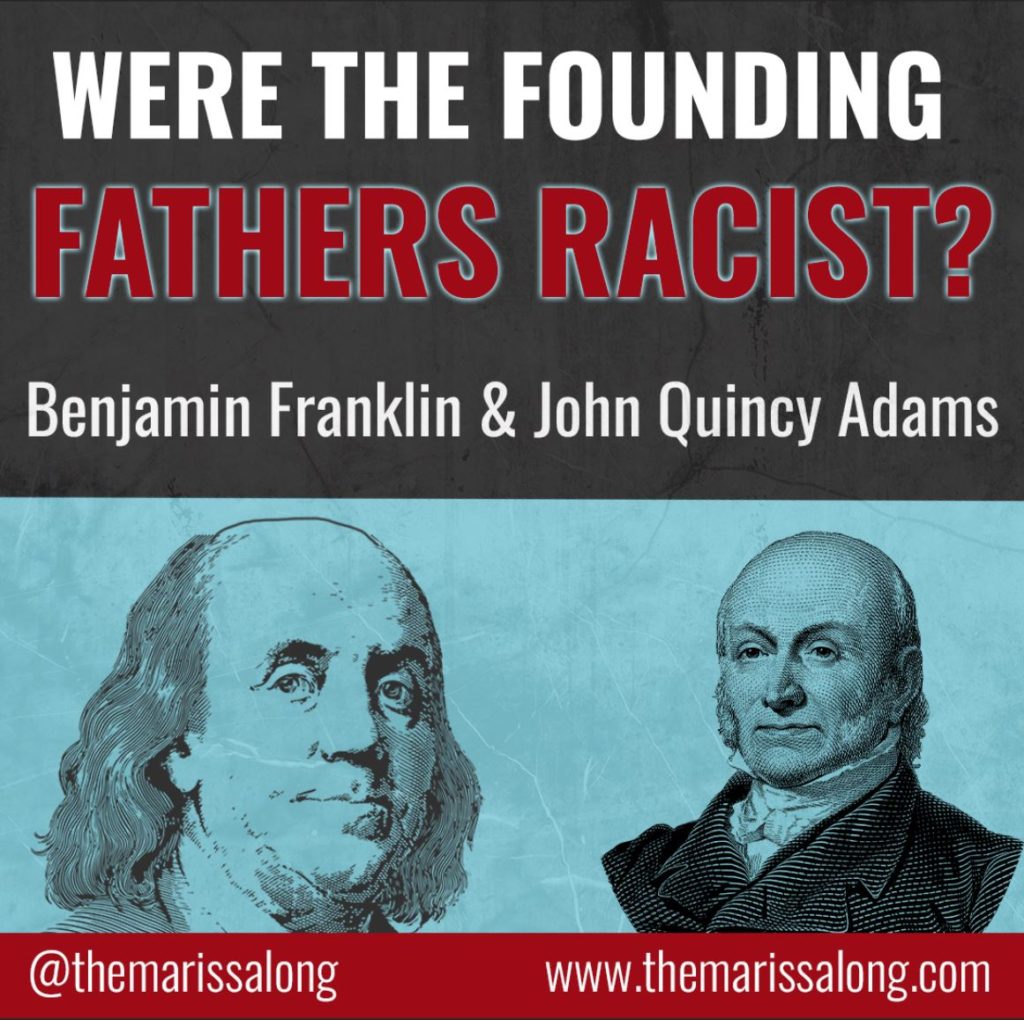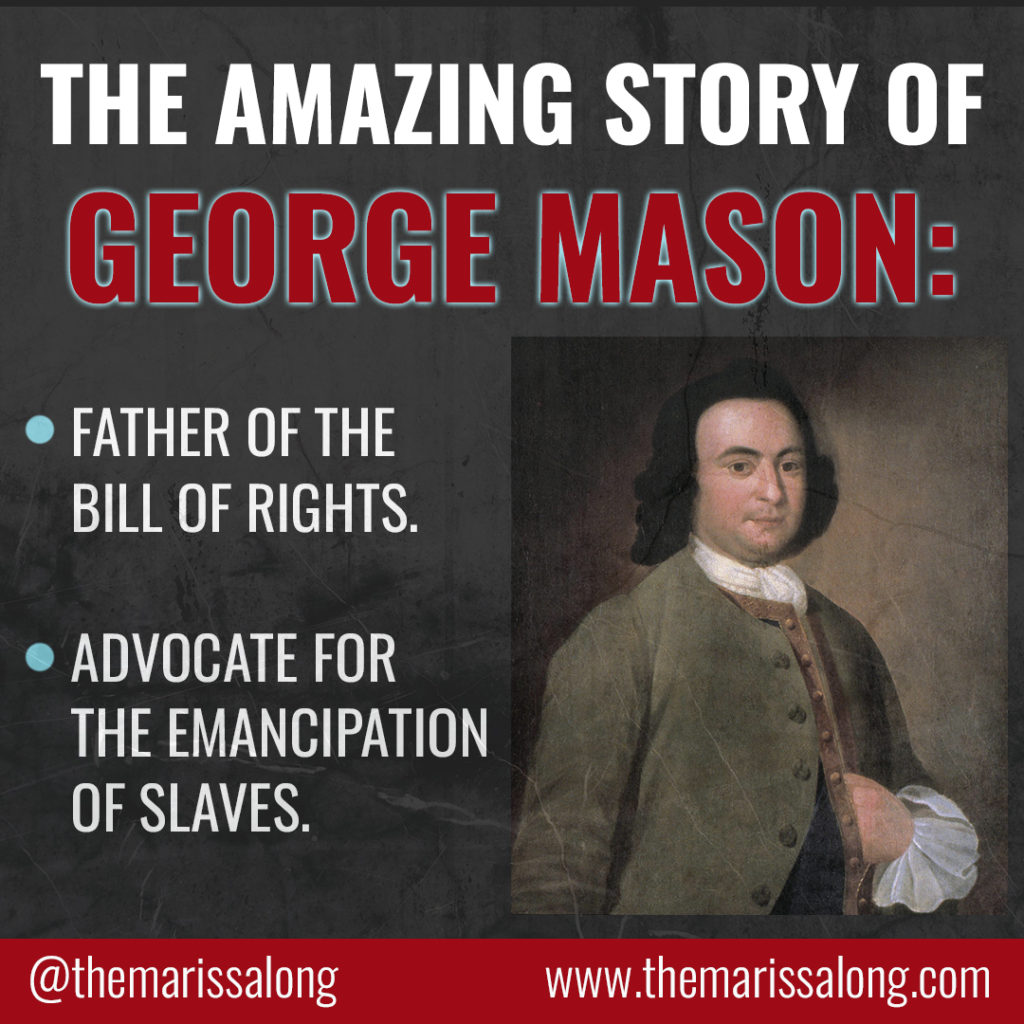Who do you think of when you picture the Founding Fathers? The first man that comes to my mind is George Washington. Then I think of Thomas Jefferson, James Madison, and Benjamin Franklin.
But what about George Mason? The Father of the Bill of Rights. An advocate for the emancipation of slaves. A neighbor of George Washington.
Have you ever heard of George Mason? Let me know in the comments!
George Mason’s Early Life
George Mason was born in modern-day Fairfax County, Virginia on December 11, 1725. His father was George Mason III, and his mother was Ann Thomson Mason. Sadly, his father died when young George was only 10 years old, and his uncle, John Mercer, assisted in raising the young boy. Tradition has it that John Mercer’s library was full of 1,500-volumes of books, and Mason read from that library.
George Mason & The American Revolution
George Mason had many interests despite his poor health as an adult. He was part of the Ohio Company in 1749 and also participated in founding the town of Alexandria, Virginia. Though his health made it difficult to serve in public offices, he accepted election to the House of Burgesses in 1759.
George Mason owned 15,000 acres and was the richest man in Virginia. He was also dear friends with George Washington, who also lived in Virginia. When George Washington took the position of “Commander of the Continental Army, George Mason was drafted by the citizens of Virginia to fill Washington’s place in the Continental Congress.”
By 1775, the American Revolution was beginning to take flight, and Mason stepped up as a leader of the Virginia patriots.
With James Madison’s assistance, George Mason also “drafted the Virginia Declaration of Rights, which was adopted by Virginia’s Legislature, June 12, 1776” (AmericanMinute). George Mason would eventually be called the Father of the Bill of Rights due to his extensive work in the Constitution and its amendments.
Mason’s declaration of rights was the first authority on inalienable rights, and Thomas Jefferson was influenced by Mason’s declaration when Jefferson wrote the Declaration of Independence. Once Mason set this precedent of God-given inalienable rights, most of the other states followed suit with their state constitutions.
Mason also “served as a member of the Virginia House of Delegates from 1776 to 1788.”
Mason’s Views on the Constitution & Slavery
George Mason played an integral part in drafting the Constitution as we have it now. When the Founding Fathers agreed to compromise on the issue of slavery, allowing the slave trade to continue until 1808, George Mason put up a staunch fight to abolish slavery right then and there.
Mason’s stance against slavery was tough. He dubbed slavery a “slow poison” and pushed for “the gradual emancipation of all slaves.”
The Father of the Bill of Rights is recorded on August 22, 1787, as saying, “Every master of slaves is born a petty tyrant. They bring the judgment of heaven upon a country. As nations cannot be rewarded or punished in the next world, they must be in this. By an inevitable chain of causes and effects, Providence punishes national sins, by national calamities.”
Perhaps Mason was prophetic because less than a century later, America fought a bloody civil war to free the slaves in bondage on her shores.
Mason took such a strong stand against slavery and other governmental issues during the Constitutional Convention that his friendship with George Washington was severed.

Francis Scott Key & His Fight Against Slavery
George Mason And The Bill of Rights
George Mason was joined by Patrick Henry in his belief that the Constitution did not limit the government enough. Patrick Henry did not attend the Constitutional Convention because “he did not want to lend legitimacy to a meeting he considered would undermine states’ rights.”
George Mason attended the convention to represent Virginia, and fellow Virginian, Edmund Randolph, wrote that “those [plans] proposed by George Mason [for the new American government] swallowed up all the rest.”
In the end, George Mason was not satisfied with the governmental limitations the Constitution enforced, and he refused to sign the U.S. Constitution. The Father of the Bill of Rights said, “There is no declaration of rights, and the laws of the general government being paramount to the laws and constitution of the several states, the declarations of rights in the separate states are no security.
Mason and Patrick Henry drafted a proposed list of Amendments to further limit the Federal government under the Constitution, hence Mason earning the name Father of the Bill of Rights.
The state of Virginia was reluctant to ratify the Constitution, and Mason guaranteed his fellow Virginians that if they ratified the Constitution, it would be amended according to what he and Patrick Henry had drafted. “On June 25, 1788, Virginia became the 10th state to ratify the U.S. Constitution” (AmericanMinute)
Mason played a large role, according to Thomas Jefferson, in forming the Bill of Rights, and he submitted language for the First Amendment of the Constitution. Mason worked tirelessly to form the fledgling country that is now America.
After blood, sweat, and tears, the U.S. Bill of Rights was ratified in December 1791.
George Mason’s Death
The Father of the Bill of Rights returned to his home, called Gunston Hall, in Fairfax after the Constitutional Convention had concluded. Less than a year after the Bill of Rights was ratified, Mason passed away on October 7, 1792. He had poured his life into shaping America and her Constitution.
Did George Mason Own Slaves?
George Mason staunchly opposed slavery, but he was a moral paradox of his day: he owned slaves at his home in Fairfax. At his death, his will records 36 slaves who were part of his children’s inheritance.

Were the Founding Fathers Racist? Learn more here!
Like Washington and Jefferson, Mason perplexes us today. How could he own slaves and yet condemn it at the same time?
For example, in the Fairfax County Resolves (July 18, 1774), Mason states “that it is the Opinion of this Meeting that during our present Difficulties and distress, no Slaves ought to be imported into any of the British Colonies on this Continent; and we take this Opportunity of declaring our most earnest Wishes to see an entire Stop forever put to such a wicked cruel and unnatural Trade.”
Also, in Journal Notes of the Virginia Ratification Convention Proceedings (June 17, 1788), Mason records that “the augmentation of slaves weakens the states; and such a trade is diabolical in itself, and disgraceful to mankind.”
Mason obviously opposed slavery, yet he owned slaves himself. We can never justify this in our minds. However, we must understand that we can’t judge men of the past according to our standards.
An easy example of this is clothing standards. Back in the 1700s, it would have been scandalous for a woman to wear jean shorts in public. But today, it’s considered perfectly normal and moral.
The issue of slavery is of much more weight and deserves much more consideration than women’s fashion, but the Founding Fathers had to contend with the issue of Britain forcing slavery into the colonies. Britain brought slavery to America’s shores, and the Founding Fathers were trying to unite a new country, while at the same time, trying to destroy the slave trade that provided southerners with the labor they thought they needed. Furthermore, the Founding Fathers were so steeped in that culture that it was quite normal (and thought to be moral) to own slaves.
As Genesis 6:9 says, “This is the genealogy of Noah. Noah was a just man, perfect in his generations. Noah walked with God” (New King James Version).
Noah was “perfect in his generations”. He wasn’t perfect according to today’s people. He was righteous in his time. We have to judge figures in history through the lens of the past, not the lens of today.
It is right for us to condemn Goerge Mason’s participation in slavery. He was wrong to enslave fellow human beings. But modern writers try to condemn his work in drafting the Constitution and founding the Bill of Rights. We can’t condemn his great work in establishing America as a free country, even though we do condemn the fact that he owned slaves.
Conclusion
So there you have it. The history of George Mason, the Father of the Bill of Rights, his contributions and view of the U.S. Constitution, and his fight against slavery. He was truly an incredible man.

George mason said….”this constitution is unfit to govern a nation….
But why can I not find this quote any more ???
I did not use this quote in my post, so I’m not sure where you originally found it. Perhaps try Googling, and see if it comes up that way. If it doesn’t, maybe Mason didn’t say it. Hope this helps!